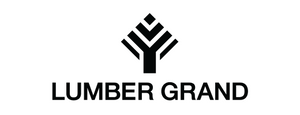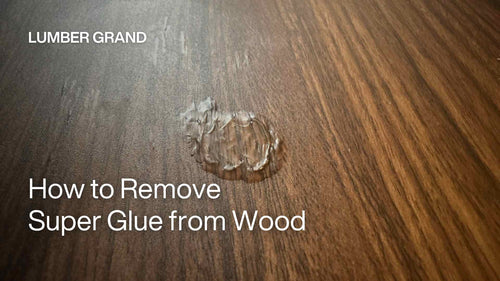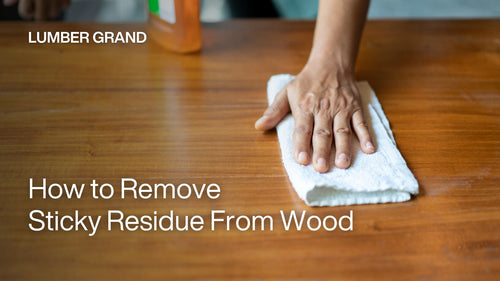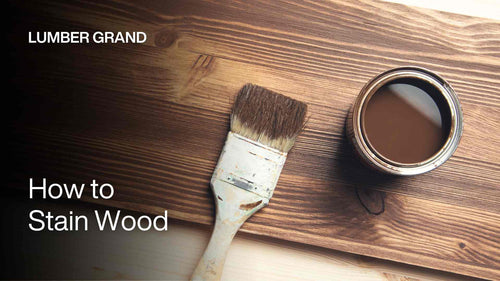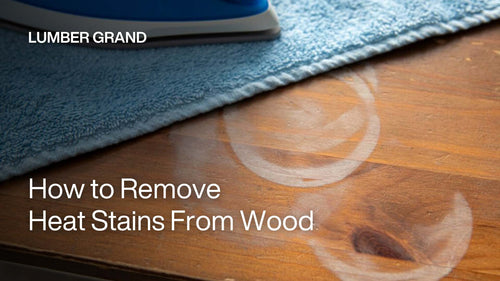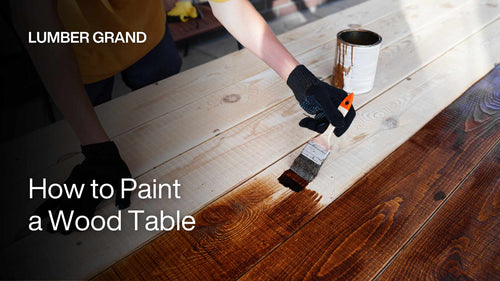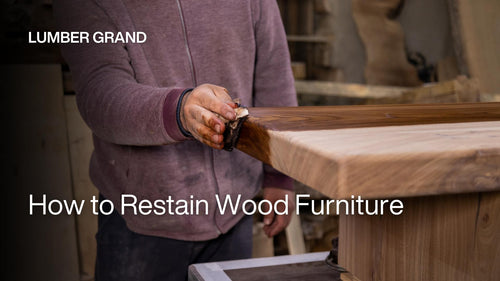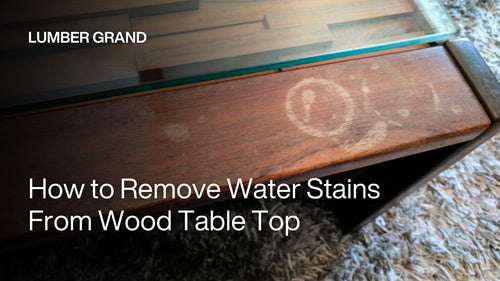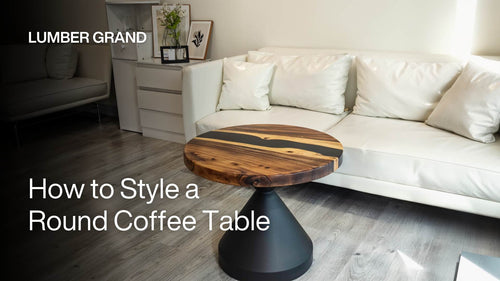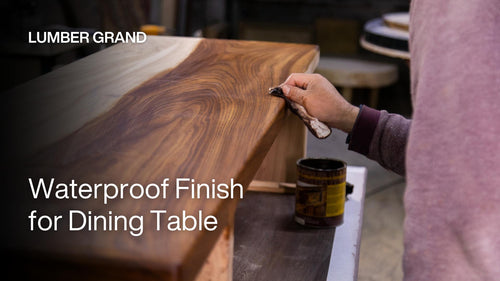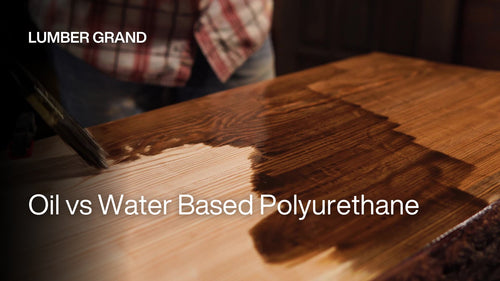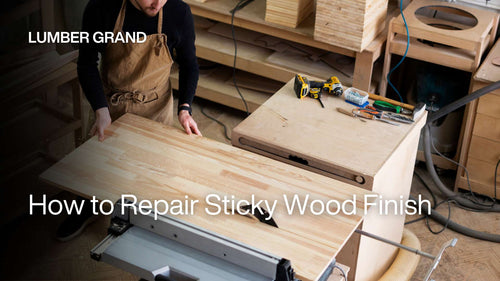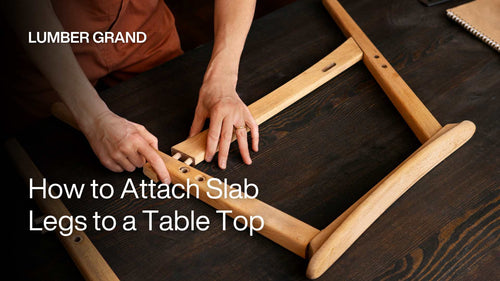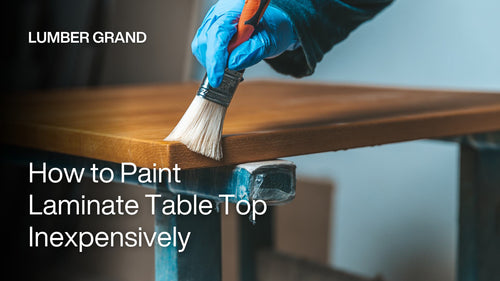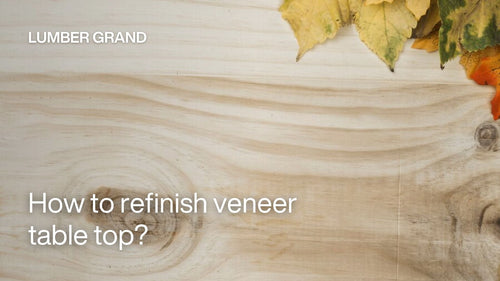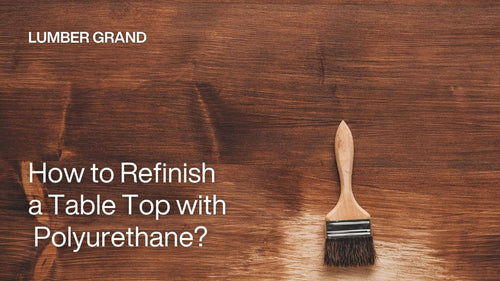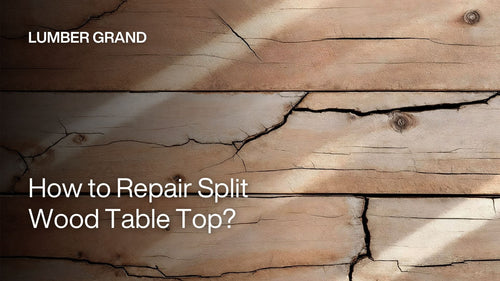Understanding how to remove ink from wood can turn disasters into easy fixes. That ballpoint pen leak, Sharpie accident, or marker mishap on your table isn't permanent, even when it looks scary. Don't reach for whatever cleaner is within arm's reach. The key to success lies in matching your method to the type of ink and the finish on the wood.
Baking soda paste works for fresh stains. Rubbing alcohol lifts pen ink in seconds. Even stubborn permanent marker comes off with the right approach of how to get ink off wood. Lumber Grand tested 7 household methods that actually work without damaging your furniture. Let's get that stain out before it sets.
Different Types of Ink and Why They Matter
Ink stains don't all act the same. A ballpoint pen mishap on your dining table top needs a completely different approach than a Sharpie mark your kid left on the dresser. Taking note of what kind of ink you're working with can save you time and also keep you from trying removing ink stains methods that won't work.
Below is a quick breakdown of common ink types and what you're up against:
|
Ink Type |
Common Source |
Penetration Speed |
Removal Difficulty |
Optimal Approach |
|
Water-Based Ink |
Fountain pens, washable markers, and some gel pens |
Slow on sealed wood, fast on unfinished |
Easy (fresh) to moderate (dried) |
Baking soda paste, rubbing alcohol |
|
Ballpoint Pen Ink |
Standard pens (Bic, Paper Mate) |
Moderate — oil-based formula |
Moderate |
Rubbing alcohol, hand sanitizer |
|
Gel Pen Ink |
Gel pens (Pilot G2, Uni-ball) |
Moderate to fast |
Moderate to hard |
Rubbing alcohol, magic eraser |
|
Permanent Marker |
Sharpies, industrial markers |
Very fast — designed to bond |
Hard to very hard |
Rubbing alcohol, acetone (with caution), or sanding |
|
Highlighter Ink |
Highlighters (liquid or alcohol-based) |
Slow on sealed, moderate on unfinished |
Easy to moderate |
Rubbing alcohol, baking soda |
|
Stamp Pad Ink |
Rubber stamps, ink pads |
Fast — dye-based |
Moderate to hard |
Rubbing alcohol, magic eraser |
|
Printer Ink |
Inkjet cartridge leaks |
Moderate |
Moderate |
Rubbing alcohol, hand sanitizer |
Summary Table: How to Remove Ink from Wood in One View
Before getting to the details, here is an overview of the 7 methods that Lumber Grand compiled. So that you can go directly to the method that best suits your situation and needs.
|
Method |
Best For |
Caution |
|
Baking Soda Paste |
New, light ink stains |
Non-gel white toothpaste only. Avoid using firm scrubbing on delicate finishes. |
|
Baking Soda + Toothpaste |
Finished or sealed wood |
Test first — some toothpastes may dull high-gloss finishes |
|
Rubbing Alcohol |
Ballpoint or permanent marker ink |
Test first because it can strip shellac and lacquer. Use sparingly and wipe clean immediately. Don't use it on antique furniture. |
|
Hand Sanitizer |
Quick clean-up for small stains |
Use gel-type alcohol-based sanitizer (60%+ alcohol) and avoid strong fragrances or added dyes |
|
Magic Eraser |
Shallow stains or inks on coated wood |
Can dull shiny coatings — rub lightly |
|
Nail Polish Remover (Acetone) |
Deep or resistant stains |
Test carefully — can remove finish or stain color |
|
Sand and Refinish |
Deep-set ink on unfinished wood |
Only for last resort. You can reapply oil or finish after sanding |
You might like: How to Remove Sticky Residue from Wood
How to Remove Ink from Wood: 7 Easy Ways Anyone Can Try at Home
Now, let's get into the solutions. Each of the following methods addresses a different type of ink and wood table top finish. Try the mildest one that applies to your situation, and work your way up if necessary.
1. Baking Soda Paste — Gentle Fix for Fresh Ink Stains
This is your go-to method when you catch ink stains early. Baking soda paste acts much like a gentle scrub. It lifts fresh ink without attacking your wood finish. It is mild enough for sealed surfaces and will not scratch when used correctly. Baking soda is a mild abrasive that breaks down ink particles while absorbing moisture.
Follow these simple steps:
-
Step 1: Mix 2 — 3 tablespoons of baking soda with water until it creates a thick paste.
-
Step 2: Use a little bit on a 'hidden' area, let it sit for a minute, then wipe clean and check for damage to finish.
-
Step 3: Dab the paste on the ink mark with your finger or a soft cloth. Apply a thin layer over the area with the stain.
-
Step 4: Using a soft rag, rub the space in small circular motions, going with the grain of the wood. Allow to sit for 2 — 3 minutes, longer up to 5 minutes for stubborn stains, but do not let it dry completely.
-
Step 5: Wipe away all paste with a damp cloth, then dry completely. If the stain remains, repeat or move to a stronger method.

How to remove ink stains with baking soda
Photo: Freepik
2. Baking Soda + Toothpaste — Mild Abrasive for Finished Wood
When just using baking soda paste isn't enough, introducing toothpaste may boost your cleanup without damaging your wood finish or worse. The two create a slightly stronger abrasive to get rid of dried ink and tough marks while being gentle enough for your sealed wood finish.
How to get ink off wood table with baking soda and toothpaste:
-
Step 1: Mix 1 tablespoon of baking soda with 1 tablespoon of plain white toothpaste (non-gel) until smooth and combined.
-
Step 2: Apply a little to a hidden spot, rub gently for 10 seconds, and wait a minute. Then wipe clean to check for finish damage.
-
Step 3: Dab the paste directly onto the ink mark with your finger or soft cloth. Cover the entire stained area with a thin layer.
-
Step 4: Using a soft cloth or old toothbrush, rub in small circular motions following the wood grain for 30 — 60 seconds.
-
Step 5: Remove all paste residue with a damp cloth, then dry completely. If the stain remains, repeat or move to a stronger method.

How to get sharpie off wood with toothpaste and baking soda
Photo: Ambercleans7350
You might be interested in: How to Remove Acrylic Paint from Wood
3. Rubbing Alcohol — Quick Solution for Marker and Pen Ink
Rubbing alcohol (isopropyl alcohol) is your go-to for fresh ink stains and most marker types. This method works especially well on how to get ink off a wood table surface or a cabinet that has a polyurethane or durable finish.
How to remove ink stains with rubbing alcohol:
-
Step 1: Always test the alcohol in a hidden area, under the table edge, or inside a drawer to see if it will damage the finish. Wait a minute to check. If you see any damage, STOP and try a different method.
-
Step 2: Wet a soft cloth or cotton wool ball with rubbing alcohol. Don’t soak it, tap it so it’s damp, not dripping.
-
Step 3: Gently dab the ink stain. Don't rub back and forth yet. Let the alcohol start breaking down the ink for 10 — 15 seconds
-
Step 4: Use light pressure to wipe along the wood grain in one direction. This lifts the ink without spreading it around.
-
Step 5: Change to a clean portion of the cloth as you start picking up ink. Keep blotting and wiping until it disappears.
-
Step 6: Wipe the area clean with a damp cloth to remove alcohol residue and allow it to dry completely
Note: For stubborn ballpoint pen marks, hold an alcohol-soaked cotton ball on the stain for 20 — 30 seconds before wiping. Give it some time to penetrate deeper into the ink.

How to remove ink stains wood table with rubbing alcohol
Photo: WebMD
4. Hand Sanitizer — Everyday Hack for Fast Ink Removal
Hand sanitizer works surprisingly well on ink stains because most brands contain 60 — 70% alcohol. You probably already have it sitting on your counter. So this is one of the most convenient methods for how to remove pen ink from wood furniture in a pinch.
However, like rubbing alcohol, hand sanitizer can damage certain wood finishes, so please use the same caution.
How to get sharpie off wood with hand sanitizer:
-
Step 1: Check a hidden spot first with a small dab of sanitizer. Wait a minute to make sure it won't harm the finish.
-
Step 2: Squeeze a small amount of hand sanitizer directly onto the ink stain. You don't need much, about the size of a pea.
-
Step 3: Let it sit for 30 — 60 seconds to break down the ink. Don't let it sit longer, or it might affect the finish.
-
Step 4: Using a soft cloth, gently rub in circular motions following the wood grain. The ink should start lifting right away.
-
Step 5: Wipe away all sanitizer residue with a damp cloth, then dry the area completely
Note: For gel-based sanitizers, you might need to apply a bit more pressure since they're thicker than liquid versions.

How to remove pen stains with hand sanitizer
Photo: Freepik
Read more: How to Remove Super Glue from Wood
5. Magic Eraser — Easy Way to Buff Off Light Stains
Will Magic Eraser remove ink? Yes, Magic Eraser, or melamine foam, acts like super-fine sandpaper to gently buff away surface ink without harsh chemicals. This works best for light ink marks on sealed wood finishes like polyurethane or varnish. Use it sparingly, since the delicate surfaces will become dulled if you scrub too hard
How to remove ink from wood table with a Magic Eraser:
-
Step 1: Always test on a hidden spot first. Wet the Magic Eraser, wring it out well, and rub gently for 5 — 10 seconds. Check to see if it dulls the finish.
-
Step 2: Wet the Magic Eraser with water and squeeze it just until it's moist, not dripping wet.
-
Step 3: Gently rub the ink stain in small circular motions using very light pressure. Let the eraser do the job, not your arm strength.
-
Step 4: Every few seconds, stop and check if the ink is gone. Stop right away if it is, to avoid taking too much finish off the wood.
-
Step 5: Using a moistened cloth, wipe away the remaining dirt and let it dry completely.
Note: Magic Erasers are best at lifting light stains on the surface. Stop at any sign of the finish dulling or hazy and apply wood polish to the area to bring back the shine. DON’T use this method on unfinished wood or surfaces with a satin finish or matte.

How to get sharpie off wood with Magic Eraser
Photo: Reviewed
6. Nail Polish Remover (Acetone) — Strong Remedy for Stubborn Ink
Acetone-based nail polish remover is the heavy hitter for ink stains that are stubborn enough not to budge with gentler methods. It is going to dissolve ink fast, but it's also aggressive enough to damage wood finishes if you're not careful. Try this only when alcohol and other safer options haven't worked for how to get ink out of hardwood floors.
Here is how to remove ink stains with nail polish remover:
-
Step 1: Test on a completely hidden spot first. Acetone can strip finishes, so this step is critical.
-
Step 2: Take the cotton swab and dip it into the remover, and squeeze out the excess. You want the cotton swab 'damp' and not dripping.
-
Step 3: Lightly dab the area starting from the outer edge and work your way towards the middle to prevent the ink from continuing to spread.
-
Step 4: Allow it to set for only 5 — 10 seconds and immediately wipe it off with a clean, damp cloth. Don't allow the acetone to sit on the wood.
-
Step 5: Then, you need to inspect the stain. If it’s still there, repeat with a new cotton swab. Apply in short bursts, rather than one long application.
-
Step 6: When the ink is off, use a damp cloth and wipe the whole area clean of acetone before letting it dry completely.

How to get ink off wood with nail polish remover
Photo: It's Kacey Quinn
Latest blog this week: How to Remove Epoxy from Wood
7. Fine Sanding + Refinish — Last Resort for Deep-Set Stains
This is your last resort when the ink has thoroughly absorbed into the wood and you've tried every other way. It will remove the stained layer of wood, so you'd want to refinish that spot to match the rest of your furniture. Save this for ink stains that have really set in after you've exhausted every other trick.
Below is how to get sharpie off wood with sanding:
-
Step 1: Make sure you've tried gentler methods first. Sanding is permanent and requires refinishing work afterward.
-
Step 2: Start with 220-grit sandpaper and move it in the direction of the wood grain.
-
Step 3: Take a break every 15 — 20 seconds, wiping away the dust to inspect if the ink has disappeared. Stop at this moment because one does not want to sand deeper than necessary.
-
Step 4: Wipe off all dust with a tack cloth or a lightly dampened rag. Allow the wood to completely dry before refinishing.
-
Step 5: Use a wood stain or finish that matches your existing surface. Apply thin, even coats following the product directions.
-
Step 6: Let each coat of stain dry thoroughly. You will most likely need 2 — 3 coats to get the colour close to the existing area.

How to remove ink stains with sanding
Photo: Freepik
Read more: How to Get Scratches Out of Wood
Extra Tips: How to Protect Wood After Removing Ink Stains
Once you’ve finished learning how to remove ink from wood, do not forget this last step. Cleaning will remove some of the natural oils and the protective finish of the wood. Here's how to seal and protect your wood after ink removal:
-
Apply a wood conditioner, furniture wax, or light oil such as lemon oil or tung oil. Rub it into the grain with a soft cloth, then buff until it shines. For larger areas, consider reapplying polyurethane or varnish to match the existing finish.
-
Keep water-based pens, markers, and ink bottles off the surface of the wood. Keep pens, markers, and ink bottles off wood surfaces. Use a desk pad or mat for writing areas. Store pens in drawers or containers instead of leaving them loose on wood.
-
Consider these simple additions to keep your wood looking great. You can try felt pads under pen holders and desk accessories, and placemats or desk pads for work surfaces.

Apply wood conditioner after removing ink stains
Credit: Lumber Grand
Shop now: Round Epoxy Coffee Table 23" Diameter
FAQs
1. Does Dawn Soap Remove Ink?
No, the Dawn soap alone has limited effectiveness on dried ink. However, you can combine Dawn soap with hydrogen peroxide to break down stubborn ink stains. Mix 1 part Dawn and 2 parts hydrogen peroxide, apply to the stain, let it sit for a few minutes, then gently blot.
2. How do you Remove Dried Pen Ink?
You can try these simple methods to remove dried pen ink:
-
Start with the baking soda paste method and let it sit for 3 — 5 minutes before wiping.
-
For really stubborn dried ink, try hand sanitizer or rubbing alcohol. But you need to test first, and don’t let alcohol sit on the wood too long.
-
If those don't work, move up to acetone-based nail polish remover (test first) or fine sanding as a last resort.
3. How to Remove a Pen from Plywood?
Plywood can be tricky because it's usually unfinished or has a thin veneer that's easy to damage. You can start with the baking soda paste. It's your safest bet for plywood since it won't strip finish or soak too deeply. If the ink has soaked in deeply, try the rubbing alcohol method with light pressure. Avoid Magic Erasers and harsh scrubbing on plywood since the surface layer is thin and can sand through easily.
How to Remove Ink from Wood: Guide Ends Here
That’s everything from our guide on how to get pen off wood table. As you can see, getting ink off wood doesn't have to mean ruining your furniture. Whether you're dealing with a fresh pen mark or stubborn dried ink, there's a method that fits your situation.
-
Start with gentle choices like a baking soda paste or rubbing alcohol. Don't go straight for the heavier solvents.
-
Remember to test discreet areas first, work with the wood grain, and try to get to it quickly. It’ll come out much easier with a fresh stain than with a dried stain.
-
Keep rubbing alcohol and soft cloths handy so you're ready to tackle any ink mishap without the stress or lasting damage.
Now you know exactly how to remove ink from wood without damaging your finish. Pick the method that matches your stain. Dealing with other wood stains? Check out our guide for more furniture-saving tips. Thanks for reading!
